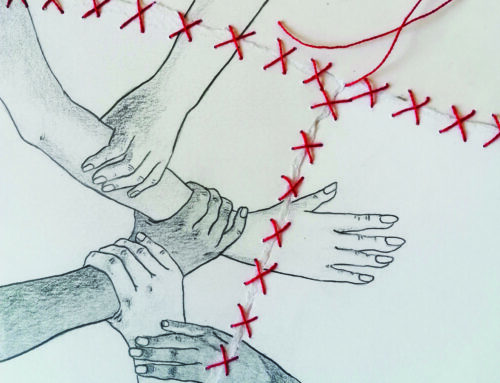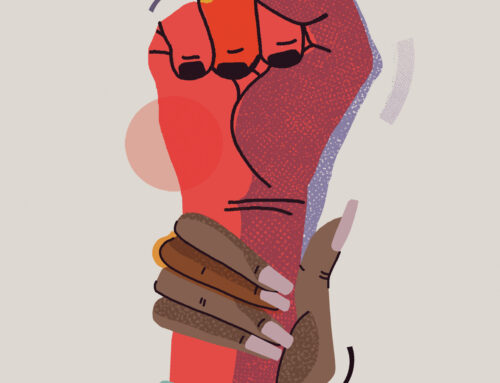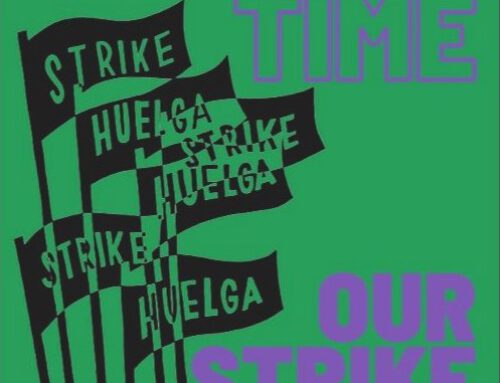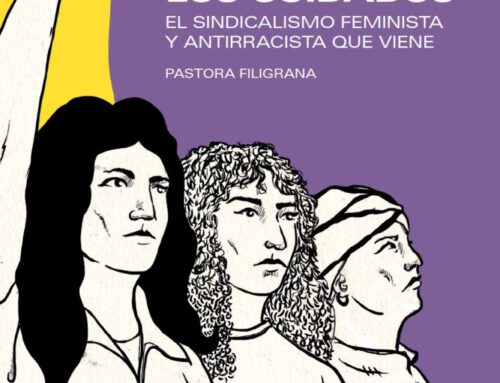By way of a prologue

Ilustración de Vane Julián, cedida por Pikara Magazine
By La Laboratoria
I
A woven image can give rise to misunderstandings. From a distance, we perceive large masses of color that make up homogeneous and unified shapes. But, when we look closer and focus in, we discover that what appeared to be a continuous image is, in reality, made up of an infinite number of points and a great heterogeneity of colors. Up close, the multiple dimensions of the weaving become clear.
La Laboratoria is a transnational apparatus for supporting feminist activist research dedicated to investigation that is situated in territories, in intimate contact with everyday life, connected to the problems that traverse us, and starts from the experiences of women and sexual and gender dissidents in struggles. We think that only in this way, by basing our thinking on conflicts, paradoxes, and challenges at ground level, can we successfully visualize the web of otherwise compact images and understand that the violence that traverses us is not singular. Starting from this proximity and commitment, the systematic dimension and complex interweaving of different (social, sexual, economic, judicial, racist) violences that we are fighting are revealed. These violences are articulated in a constant war that takes place simultaneously on many planes: imploding in homes; disciplining bodies on the streets and through (social and punitive) institutions; globally and lethally regulating the movement of people between countries; operating as a principle of authority in working class neighborhoods; looting land and common resources; exploiting vital energies; colonizing futures through the financialization of social life.
With this conviction that there is a heterogeneous set of intertwined violences, we embarked on writing this chorale book that brings together six proposals for thinking about patriarchal violence and horizons of feminist justice in a situated way. Quito, Buenos Aires, Porto Alegre, Sao Paolo, New York, and Madrid are the places where the investigations took place. Starting from the politicization of feminicides and sexual violence by the recent feminist tide, we reflect on the different manifestations of patriarchal (sexual, physical, economic, penal, psychological) violence and how it is knotted together with other forms of violence. We develop a radical critique of the punitive state and its expanding dynamics of criminalization as we seek new horizons of justice, tracing tools and strategies that enhance our capacity to act and weave together.
II
The starting point is thus the global feminist tide which reached its maximum effervescence between 2016 and 2020. From Ni Una Menos in Argentina and Mexico to Yo Sí Te Creo in Spain and Me Too in the United States, a global dynamic of politicizing patriarchal violence was able to demonstrate the systematic character of violence (“It is not an isolated case”), point to those responsible for its reproduction (as in the masterful performance “The rapist is you!”), and render visible its imbrication with processes of dispossession (“The debt is owed to us!” as feminists chanted in Buenos Aires).
Thus, in the first contribution, “How to get out of the trap?” Valentina Huelga, from Madrid, follows the trail (the slogans, calls, arguments) of a feminism that takes to the streets, at the same time as it builds the feminist strikes of 2018 and 2019, and politicizes sexual violence, understanding the judicial system as part of the problem and not the principle solution.
Lucía Cavallero, for her part, based on her participation in Ni Una Menos (Argentina), demonstrates how the feminist movement has constructed a lexicon that allows for understanding economic violence as patriarchal violence. Thus, for example, it shows how the deregulation of the rental market comes together with the nonpayment of child support by fathers, leading to the eviction of a single mother with children; or how the structural adjustment policies pushed by the IMF are connected with a reform of the pension system that denies the contribution to wealth by housewives and women working in the popular economy.
It is not a matter, then, of contrasting violence with dispossession, but rather of following the thread of their concrete imbrication and understanding, as Emanuela Borzachiello reminds us, that to violate a body, it must be dispossessed of itself. The inverse is also true: to dispossess a body, it must be violated, broken inside and out. As Lucía Cavallero recounts from Buenos Aires, feminisms have revitalized the economic debate, redefining, from the so-called “margins” of the world of recognized work, what counts as work and who produces wealth. This has allowed for opening up the question of who are the creditors of that thus redefined wealth.
III
We are currently witnessing the expansion of the penal and punitive state. That is why it is so important to remember, in all their resounding vivacity, the slogans and arguments of the global feminist tide in its radical challenge to the penal state (“the repressive state is a rapist male,” the Chilean group Las Tesis sang in 2019 and thousands of feminists from around the world sang along). Feminist groups fighting against prisons also know that this system administers “justice” in a visibly unequal way: although it argues that “women and children must be protected,” in reality, it provides nothing but a lack of protection, particularly for popular sectors. In general terms, what this system offers is impunity for certain men (white men, property-owners), who can exercise violence at will, while (impoverished and racialized) others are punished excessively, turning them into the epitome of social danger. Thus, impunity coexists with the hyper-development of punitivism, in which men from the popular sectors are used both for the reproduction of violence from below and for the legitimization of the police and penal state from above.
Tatiane da Silva’s life is a clear example of these dynamics that combine a lack of protection, criminalization, and impunity. Thus, the Coletivo Territorio em Justiça Social from Porto Alegre reflects on how punitive strategies end up reaffirming other modalities of violation of precaritized bodies and determine a hierarchy of what could be called justice. From there, they invite us to question punitive rationality and to analyze the complex relationship between justice, punishment, and violence.
For its part, the Ecuadorian group Mujeres de Frente bases its analysis on its members own experiences as women in the popular economy, between informal work and micro-illegalities. Through more than a decade fighting the effects of the expansion of punitivism on them and their families, they know that the relationship between dispossession and criminalization is not new, nor is the racism that tints prisons and working class neighborhoods. In their contribution, they try to think about the new wave of violence that is taking place in Ecuador whose lethal dynamics are still difficult to decipher. A new logic of social militarization that goes beyond the punitive is expanding in different regions of Latin America connecting masculinity and bellicosity and establishing the exceptionality of the “war on drugs” as the norm. Here the question, “How are we going to protect our daughters” cannot be separated from another: “How are we going to remove our sons from the dynamics of recruitment, in which they are placed as the last rung on the ladder of the reproduction of a violence from below that, in turn, sustains and legitimizes racism and militarization?”
IV
It is not clear to us that we can speak with rigor of a punitive feminism (who would be the punitive feminists? What would their practices, their theoretical corpus be?). However, there does seem to be an urgent need to develop an anti-punitive (and anti-militaristic) feminism capable of going beyond the mere critique of the punitive state become state of war, that interrogates the conditions of possibility of violence, and elaborates, in a more concrete and situated way, other pedagogies and other tools for the production of justice. To do so, it is important to recognize that, although many women are suspicious of the law and institutions, in many situations, for lack of something better, they continue resorting to them. It is also crucial to not ignore the feminist wisdom that reminds us that the communitarian fabrics are not only fractured, but, in many cases, are also traversed by patriarchal and colonial logics, and any strategy of justice that is based on them must take into account the material and symbolic power relations that articulate them.
Toward this end, Susana Draper and Molly Porzig, from Critical Resistance (New York) underscore the importance of raising questions that allow us to address the multiple layers of problems, without trying to solve them with “one” homogeneous solution that encompasses everything. Thus, in contrast to the individualizing approach of classical legal philosophy, they propose deploying a whole range of multilayered interventions and concrete interventions that enable weaving new relationships there where neoliberal capitalism destroys them. For her part, Helena Silvestre, from the favela territories of Sao Paolo, begins an excavation, simultaneously looking back and toward the future, to recover practices of conflict regulation (from native peoples, occupations of urban land for housing, the favelas), in which the force of the common is amplified and sophisticated, instead of weakened by delegating power to structures that we cannot control. This heritage moves away from do-goodism and includes the possibility of counter-attack or sanctioning measures such as expulsion, but the emphasis is not on punishment, but rather on rebalancing forces and strengthening and enriching the common both in the present and as a horizon for the future.
V
A weaving is also a plot or conspiracy. It is the desire to recognize and recognize ourselves, to conspire in order to dispute our personal stories that link different forms of violence and the responses that we are capable of enacting, experimenting with, or imagining. It is the aspiration to weave a web of networks of collaboration from which a situated theoretical production can emerges that would circulate transnationally, precisely as feminist struggles are doing.
This set of texts seeks to share experiences and narratives that will help keep that flame—ignited by the global feminist tide—alive. They seek to deepen its politicization of patriarchal, racist, and dispossessing violences and critique of the punitive state, at the same time as we imagine and experiment with an anti-punitive feminism that is as concrete as the blow that breaks us and the law that shackles us; a feminism capable of self-defense, to stop our energy and time from being expropriated; a feminism that makes justice an open, contentious, and collective question.







